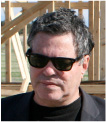| |
LECTURERS
 Amos GITAI
Amos GITAI
|
Biography
Born on October 11, 1950 in Haifa, northern Israel. From 1973, while majoring in architecture, he began independent production of architecture-themed experimental films using an 8mm camera. From 1977, created approximately 20 documentaries for Israel's state-run television. However, in 1982, due to the harsh criticism he received and ban placed on "Field Diaries" from the authorities, Gitai flew the country. Basing himself in Paris, he directed his first feature film, "Esther" (85). Afterward, he shot "Berlin-Jerusalem" (89) and "Golem, the Spirit of Exile" (92) both of which dealt with diaspora. These three would be known as Gitai's "Exile Trilogy."
During his time in Paris, he extended his activities to include theatre, but by the beginning of the 1990s, the state of affairs within Israel had significantly changed and in 1993, he returned to his homeland. Following his return, Gitai shifted his themes to the problems shouldered by Israel. He filmed the documentary "Kippur, War Memories" (97) based on his memories in the military during the Fourth Arab-Israeli War. This work is connected to the proceeding "Kippur" (00).
To date, "Kaddosh" (99), "Kippur" (00), "Kedma" (02) among others have been selected to compete at the Cannes Film Festival where Hanna Laslo won the Best Actress Award for "Free Zone" (05). Apart from being a selected director of "To Each His Own Cinema" (07), comprehensive retrospectives have been held in London, New York, Moscow, Paris, Tokyo, etc. His other woks include "Eden" (01), "Alila" (03), "Promised Land" (04), "Disengagement" (07), "Carmel" (09) and "Roses on Credit" (10).
|
|
|
 Amos GITAI
Amos GITAI